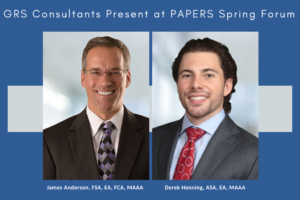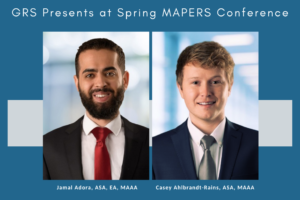Events
May 25, 2022
GRS Consultants Present at the PAPERS Spring Forum
 James Anderson and Derek Henning presented the topic “Risk Management in the Face of a Changing Economic Environment” during the 2022 Pennsylvania Association of Public Employee Retirement Systems (PAPERS) Spring Forum.
James Anderson and Derek Henning presented the topic “Risk Management in the Face of a Changing Economic Environment” during the 2022 Pennsylvania Association of Public Employee Retirement Systems (PAPERS) Spring Forum.
Session Summary: The session covered key provisions of ASOP 51, sources and measurement of risk, and how retirement systems have managed risk in the past and are currently. The presenters discussed how funding policy and benefit changes can be addressed in the context of a larger risk management framework, given improved funded status, rising inflation, and the trend towards lower investment assumptions.



